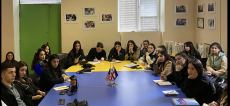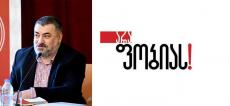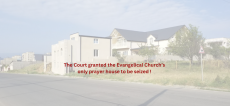
THE CASE AGAINST THE EVANGELICAL CHURCH OF GEORGIA
On February 9, the Tolerance and Diversity Institute (TDI) and the Evangelical Church of Georgia held a joint press conference on the alarming circumstances of the case against the Evangelical Church and its pastor, Zaal Tkeshelashvili.
On 9 November 2022, the Georgian Court of Appeals ordered the Pastor (the defendant) to pay the plaintiff, the US citizen, Byung Chan Park the Church donations received over several years. In fact, these donations were intended to complete the construction of ECG’s first and only prayer house. Currently, the Church is facing the danger of losing this chapel.
In 2019, Park filed a lawsuit against Zaal Tkeshelashvilli in the Tbilisi City Court, demanding the defendant to pay him the donations that the plaintiff collected from Christian believers over the years on behalf of the Church.
The City Court did not grant any of the plaintiff’s four claims. However, the plaintiff appealed this decision in the Tbilisi Court of Appeals, which in its 9 November 2022 decision, partially changed the decision of the Tbilisi City Court and ordered the defendant Zaal Tkeshelashvili to pay over USD 90,000 to the plaintiff Park. On 30 January 2023, pastor Zaal Tkeshelashvili appealed the judgment to the Supreme court of Georgia. The Tolerance and Diversity Institute (TDI) is defending the rights of the Evangelical Church of Georgia.
The plaintiff is Byung Chan Park, a U.S. citizen who first met Pastor Zaal Tkeshelashvili and the ECG members in 2014 and for the second time in 2015. He introduced himself as an Evangelical missionary, willing to “spread the gospel” and help local Evangelical Christians in Georgia.
The plaintiff seemed comfortable with his relations with the ECG for several years, visited the church, lived on the ECG’s territory for several months, invited and hosted his foreign friends there, and participated in religious services.
At the beginning of 2018, when the construction of the ECG buildings, disputed by the plaintiff, was already completed he changed his stance towards the pastor and the Church. During this period, he was contacted by certain persons, who supposedly influenced his actions. Park began to argue that the Evangelical Church of Georgia was not a real Church because of its unregistered status and that Pastor Zaal Tkeshelashvili was not a true religious leader.
After a thorough study and analysis of the case files, there is reasonable ground to believe that the plaintiff had acted maliciously, manipulating religious communities for his shady transactions and business activities. The case files include copies of allegedly falsified documents with a U.S. notary stamp. The Georgian investigative bodies and the court chose to ignore this fact. Moreover, the court based its decision against the defendant on these documents.
ECG and its pastors, Zaal and Nino Tkeshelashvili, have always been outspoken against injustices, advocating for the protection of freedom of religion and belief, equality, and democratic principles in Georgia. Several circumstances indicate that this is an attempt to damage the Pastor's reputation using a dubious civil law case, to limit his freedom of expression on the issues of injustice and equality, to take away the only chapel of the Evangelical Church, the attempt against the autonomy of the Church and the existence of an independent church.
See the report prepared by TDI on the case against the Evangelical Church of Georgia here.







